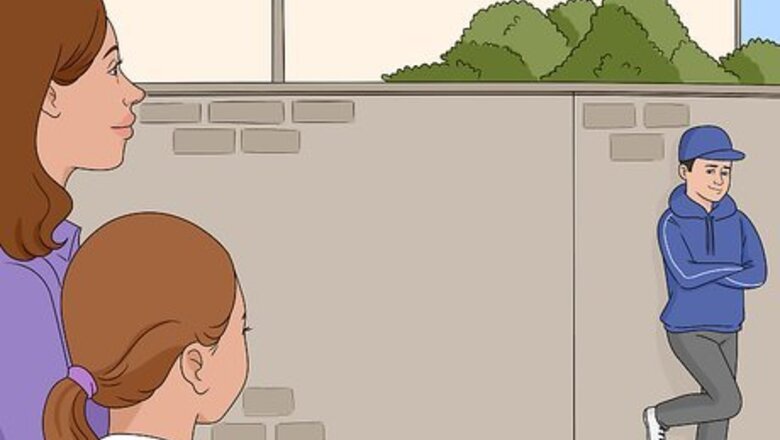
views
Use the buddy system when you go places.
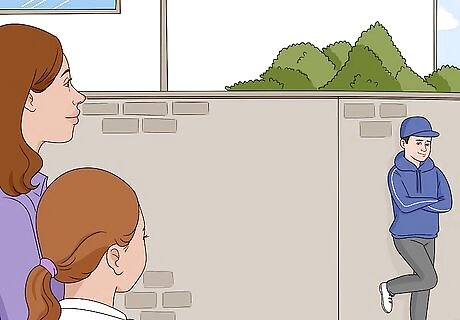
Take a friend or adult with you if you know your bully is nearby. This might be on the bus, in the hallways, or during lunch. Try to avoid areas where there are no other students or teachers around. While this is a great way to keep yourself safe, it isn’t a long-term solution. If you or your friends are being bullied, report it to a teacher or a parent right away. If you’re a teacher or staff member at a school, consider asking a responsible student to walk with a kid who is being bullied.
Walk away from the bully.
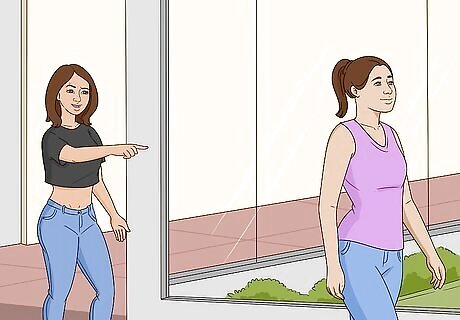
Ignore what they’re saying and leave the area. You don’t even have to say anything; just stand up calmly and get out of there. Try to find a new spot where there are other people around so your bully leaves you alone. If you're dealing with a cyberbully, stop responding to the bully's messages or log out of the site. To further remove yourself from the situation, block the bully so they can't contact you directly.
Tell the bully to stop.
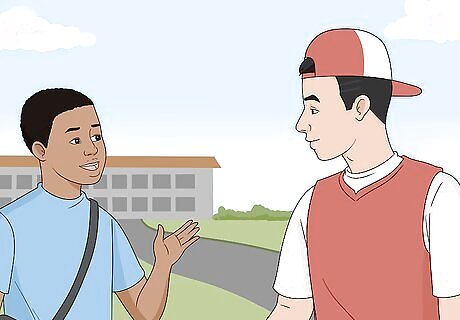
Call out their behavior to shut them down. Calmly look at the bully and tell them that their actions aren’t appropriate or that they’re being disrespectful. You can do this if you’re the one getting bullied or if you see anyone else getting bullied, too. And if your issues are with an online bully, this technique can still be super helpful. Use caution if you try to do this. Sometimes, telling a bully to stop can make them angry, especially if you say it in front of a group of people. Say something like, “Could you just stop?” or, “That’s not funny. Please stop.”
Act like you’re bored.
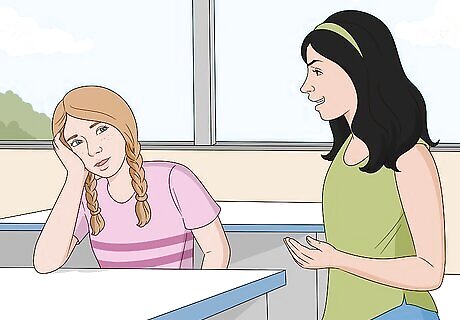
If bullies can’t get a rise out of you, they’ll probably back off. If someone says something hurtful to you, look at them with a blank expression on your face. You could follow up with something like, “Why are you so interested in me?” Most bullies bully people to get a reaction out of them. If you don’t give them anything, they might get confused. Plus, you can use this tip against a cyberbully as well. Why not respond to their message with something witty, like: "I'm bored. Got any more material?"
Come up with a funny comeback.

Adding humor to the situation can stop a bully in their tracks. If you’re good at joking around and you don’t feel super threatened, try to laugh off the comments or say something funny back (and note that these quips could be used against a cyberbully, too). Don’t insult the bully too much; say things like: “Here we go again. This is getting kind of boring, could we stop?” “Do you feel better now?” “I’ve been called way worse than that.”
Intervene if you see someone else being bullied.
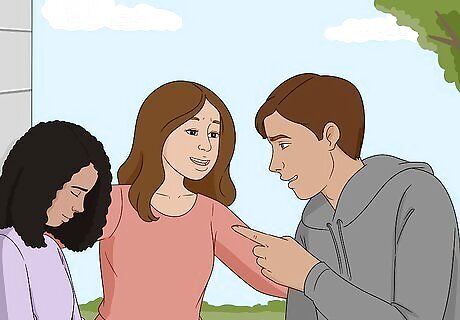
Bullies need to know that bullying is never okay. If you see your friend or classmate being bullied, get an adult to help you before heading over. The adult will help the person being bullied and (hopefully) get the bully in trouble. It’s super important to call out bullying when you see it. If bullies are allowed to bully, they’ll just keep doing it. If the bully has a weapon or is threatening serious harm, call for emergency services right away. If you’re the adult in this situation, immediately try to separate the kids and get them away from each other. After that, you can talk to each person and figure out what’s going on.
Support victims of bullying.
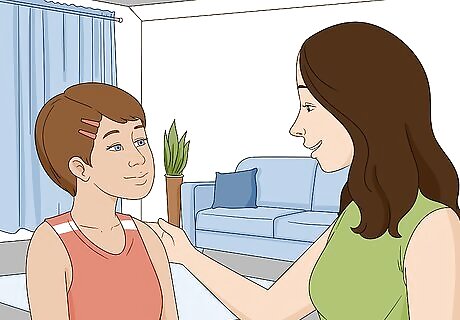
People who are bullied often feel isolated and unsupported. If you notice that your friend or classmate gets bullied a lot, reach out to them and make sure they know you’re there for them. Ask them what you can do to help them feel safe, and offer to help them report their bullying to an adult. You should also assure the victim of bullying that it’s not their fault. Say something like, “Hey, I’m sorry that those kids are so rude to you every morning. Do you want me to walk with you to class? They probably won’t bother you if there’s two of us.” If you’re a teacher or parent and you see a child getting bullied, do your best to get the bully in trouble to support the victim.
Don’t participate in bullying behavior.
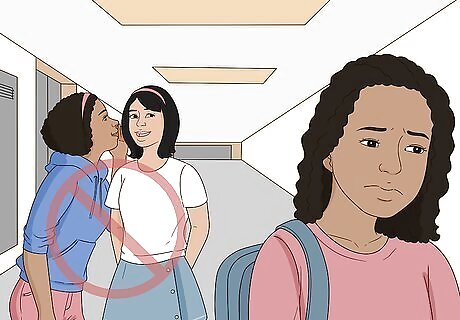
It might seem harmless now, but bullying someone can really hurt them. If you see your friends or classmates teasing someone, making fun of them, or saying rude comments, don’t participate. If you feel comfortable, you could even say something like, “That’s not cool,” or “You guys are being really lame right now.” Watching your friends bully someone else isn’t okay, and you should report them to an adult right away.
Report cyberbullying.

Take screenshots if you or someone else is being cyberbullied. If the person bullying you goes to the same school, you can report them to your principal. If they’re threatening serious harm or they don’t go to your school, you can report them to your local law enforcement. Once you’ve taken screenshots of the bullying, block the person so they can’t contact you anymore.
Talk to a trusted adult.
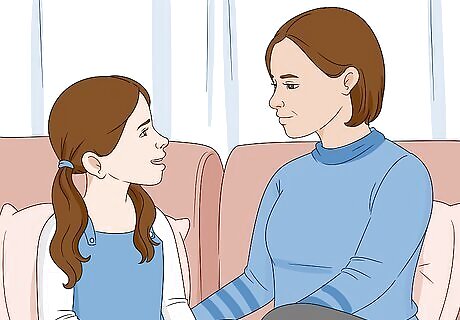
If the bullying keeps happening, an adult can help you deal with it. Reach out to a parent, a family member, a teacher, or a guidance counselor and explain what’s going on. Talking to someone else can help you feel less afraid and alone and it can help you determine what you need to do next to prevent any further bullying. If you feel threatened or unsafe, it’s best to talk to someone who has authority over the bully and can intervene on your behalf, such as a teacher, boss, or police officer.
Look out for the warning signs of bullying.
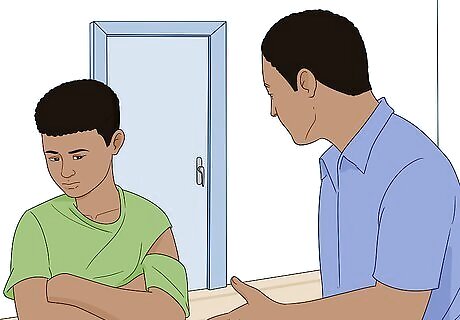
If you’re a parent or a teacher, it’s important to keep an eye on your kids. If any of your children has injuries they can’t explain, has lost or stolen property, or is suddenly avoiding school or certain areas, they may be getting bullied. Youth with disabilities, autistic kids, members of the LGBTQ+ community, and minorities are more at risk for getting bullied. Bullies may also target victims based on race, ethnicity, or religion.
Talk about bullying with others.
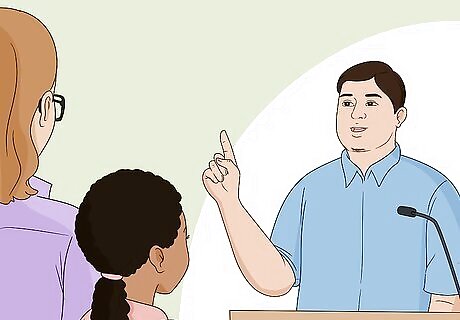
If you’re an adult, address bullying with your kids, peers, and coworkers. Remind people about the warning signs of bullying and that it should always be punished. Encourage others to talk to someone they trust if they are being bullied or know of someone else who is, and try to keep an open line of communication with any kids in your life. You could say something like, “Unfortunately, bullying is a problem at most schools. While we probably can’t stop it completely, we can encourage kids to talk to us or their teachers if they’re having problems with another student.”



















Comments
0 comment